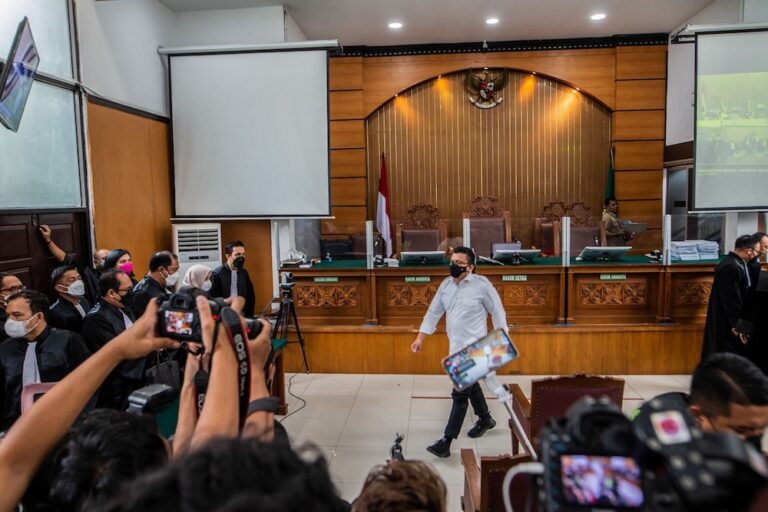(RSF/IFEX) – RSF has voiced its indignation following the Indonesian legal authorities’ announcement that the investigation into the murder of Dutch journalist Sander Thoenes has been dropped. “We are more than surprised and disappointed by this decision, which comes at a time when the investigation was nearing a conclusion and suspects had been identified,” Robert […]
(RSF/IFEX) – RSF has voiced its indignation following the Indonesian legal authorities’ announcement that the investigation into the murder of Dutch journalist Sander Thoenes has been dropped. “We are more than surprised and disappointed by this decision, which comes at a time when the investigation was nearing a conclusion and suspects had been identified,” Robert Ménard, the organisation’s secretary-general, said in a letter to Minister of Justice and Human Rights Yusril Ihza Mahendra. “It is imperative that the legal authorities review this decision. The Sander Thoenes case must not become another victory for impunity in Indonesia,” added Ménard. RSF is supporting Thoenes’ family’s call for the case to be transferred to an international court.
According to information obtained by the organisation, on 13 June 2002, Barman Zahir, spokesman for the Attorney General’s Office in Jakarta, announced that proceedings in the Thoenes case were being dropped. A Dutch reporter for the daily “Financial Times”, Thoenes was killed in East Timor on 21 September 1999. According to the attorney general, investigators did not have sufficient “evidence” to bring charges against the principal suspect, Lieutenant Camillo dos Santos, an officer of the Indonesian army’s Batallion 745, which was deployed in Dili, the East Timorese capital, when the journalist’s murder took place. Dos Santos was formally identified earlier this year as the principal suspect by a number of eyewitnesses questioned by Dutch police. The Dutch authorities have been leading their own independent investigation and have kept the Indonesian authorities regularly informed of their progress. Indonesian prosecutors said the Dutch investigators’ key witness was “untrustworthy” and frequently changed his statement. Also, while the results of the autopsy carried out by Australian forensic scientists noted bullet wounds on the journalist’s body, the conclusions of the Indonesian autopsy described knife wounds.
The announcement that the case is to be closed comes at a time when investigators appeared to be close to reaching a conclusion. Thoenes’ family and the Dutch government were expecting a trial to take place in Indonesia. Bart Jochem, spokesman for the Dutch foreign minister, stated that there was “no reason for the case to be closed.” According to Jochem, “there are, on the contrary, several reasons for bringing this case before a court.” The journalist’s family has appealed to the international community for “the murder of Sander Thoenes and other crimes committed in East Timor to be brought before an international tribunal, as the tribunal for East Timor set up by Indonesia is not making serious progress.”


